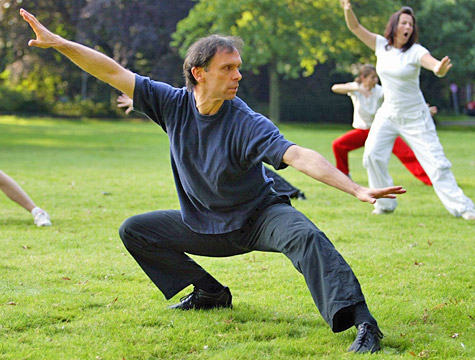The most comprehensive systematic review yet paints a promising picture for the benefits of exercise in warding off dementia
There is no pill for preventing age-related cognitive decline and dementia, but a meta-analysis suggests doctors could prescribe a strong dose of exercise instead.
Researchers have long suspected that exercise might ward off cognitive decline, but previous reviews have produced mixed results.
The most comprehensive systematic review yet paints a more promising picture.1
A meta-analysis of 39 RCTs found that supervised aerobic and resistance training over at least four weeks was beneficial to cognitive function in adults aged over 50, regardless of baseline cognitive status.
All modes of exercise – including aerobic, resistance, mixed aerobic and resistance training, and tai chi – produced significant and positive effects on cognition, except for yoga. The positive effect of tai chi was an important finding, the authors said, because it might be suitable for people who have difficulty with other forms of exercise.
The best regime for cognitive function was between 45 and 60 minutes of moderate to vigorous exercise on as many days of the week as possible, the authors said.
“This [study] is important, as there is currently no pharmacological agent for the prevention or treatment of dementia,” Dr Yorgi Mavros, a lecturer in sports science at University of Sydney, said. “Lifestyle modifications such as exercise offer a powerful tool to help prevent dementia.”
Dr Mavros said resistance training, such as lifting weights, was more likely to provide cognitive benefits than mixed aerobic and resistance training, as was suggested by the authors. Resistance training had particularly pronounced effects on executive function, memory and working memory in the study.
“While this meta-analysis cannot directly compare resistance and aerobic training, this is backed up by RCTs such as the EXCEL trial,3 whereby six months of resistance training improved cognitive function, with no improvement observed following aerobic exercise,” he said.
High intensity resistance training twice a week also produced cognitive benefits in older adults with mild cognitive impairment in an RCT conducted by Dr Mavros last year.2 These effects persisted for 12 months, he said.
The authors also reported the effect of exercise was twice as large in trials that had participants exercise on five to seven days per week, compared with three to four days per week, or one to two days per week.
“This highlights the need for people to frequently engage in exercise to receive the best benefit for their brain,” Dr Mavros said.
“However, even if people only manage to exercise two days per week, significant benefits were observed.” The mechanisms underpinning the effect of exercise on cognition were not well understood, Dr Mavros said.
But it was believed that exercise could trigger improvements in insulin resistance, systemic inflammation and reductions in stress hormones, such as cortisol – all of which were associated with worsening cognitive function and atrophy of the brain.
Similarly, exercise had also been shown to increase levels of neurotrophic hormones, such as brain-derived neurotrophic factor, which was known to be beneficial for the brain.
While the processes at play were unclear, exercise should be prescribed in the same way as other medications, Dr Mavros said.
“Perhaps the most exciting part about prescribing exercise is that the side effects are often improvements in other health conditions,” he said.
Exercise often improved glycaemic outcomes in individuals with type 2 diabetes or depressive symptoms.
“We like to think of it as a polypill,” he said.
1 Br J Sports Med. 2017 Apr 24. pii: bjsports-2016-096587.


